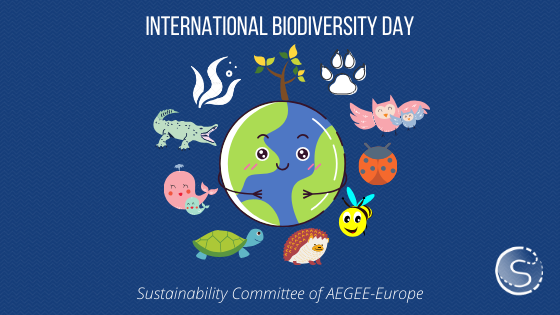Each year on 22nd of May, we celebrate the International Day of Biodiversity. From the Sustainability Committee we wanted to raise awareness of this topic. We all know a lot of species that are in danger of extinction, and this is really bad for the environment and its normal functioning. In this article we will show you what biodiversity means and its importance in nature.
Today is the International Day of Biodiversity – we are in the midst of the 6th mass extinction hence we have to act now! Biodiversity is the variety and variability of life on Earth. Biodiversity is typically a measure of variation at the genetic, species, and ecosystem level.
The theme of the International Day for Biological Diversity (IDB) in 2020 is “Our solutions are in nature”.
Did you know that 1 million species face the threat of extinction more than at any other point in human history? Land use changes, climate change, pollution and invasive species are some of the drivers. Signed by 150 government leaders at the 1992 Rio Earth Summit, the Convention on Biological Diversity is dedicated to promoting sustainable development. The Convention recognizes that biological diversity is about more than plants, animals and micro organisms and their ecosystems – it is about people and our need for food security, medicines, fresh air and water, shelter, and a clean and healthy environment to live in.
Why is it important to have Biodiversity?
A basic concept is that species depend on each other. Having more variety of species increases the ecosystem productivity. Each species has a specific role, so all roles together contribute to having a richer environment.
- Having more species will support a larger number of plants and, therefore, a greater variety of crops. Related to that it also promotes the soil formation and protection, the quantity of plants and it protects freshwater resources.
- It provides nutrient storage as well as recycling and breaking down of pollutants.
- It also contributes to climate stability, speed recovery from natural disasters and provides more food resources.
Biodiversity is about resilience. Diversity in abilities, roles, tasks etc. of different species, allows the system as a whole to recover when something changes. For example, if the temperature, the amount of water in a system or the amount of sun-hours changes, some species will die. If you have a biodiverse system, other species can then take over the role of those species that disappeared. In the absence of a biodiverse system it is possible that when a species dies off, a certain role cannot be performed anymore. If for example all the bees die out, there are a small number of other insects that exactly perform the same role, which is to fertilize the flowers, so that next year the plants can blossom again and fruits will grow.
Biodiversity is essential for human health and well-being, economic prosperity, food safety and security, and other critical areas necessary for the individual and collective thriving of all humans and all human societies. Food systems depend on biodiversity and ecosystem services. Threats to inland water biodiversity are significant, oceans contain a wealth of biodiversity, climate change is a major and growing driver of biodiversity loss.
We love diversity in nature, but we all love diversity in our communities and organisations! The best part about AEGEE is the different cultures, the best part about nature is the different species.
To finalise, I would like to say thanks to all the people who helped with this article!
Sources
- https://www.cbd.int/
- https://science.howstuffworks.com/life/evolution/mass-extinction1.htm
- You can get more information, get involved and engage in websites like GYBN, WWF or IUCN.




